'68's Josh Scogin: “The guitar is the closest thing I have to the other side of that pandemic tunnel”
The noise-punk frontman talks returning to the stage post-Covid, his copious pedal collection and the Atlanta duo's raucous new album, Give One Take One
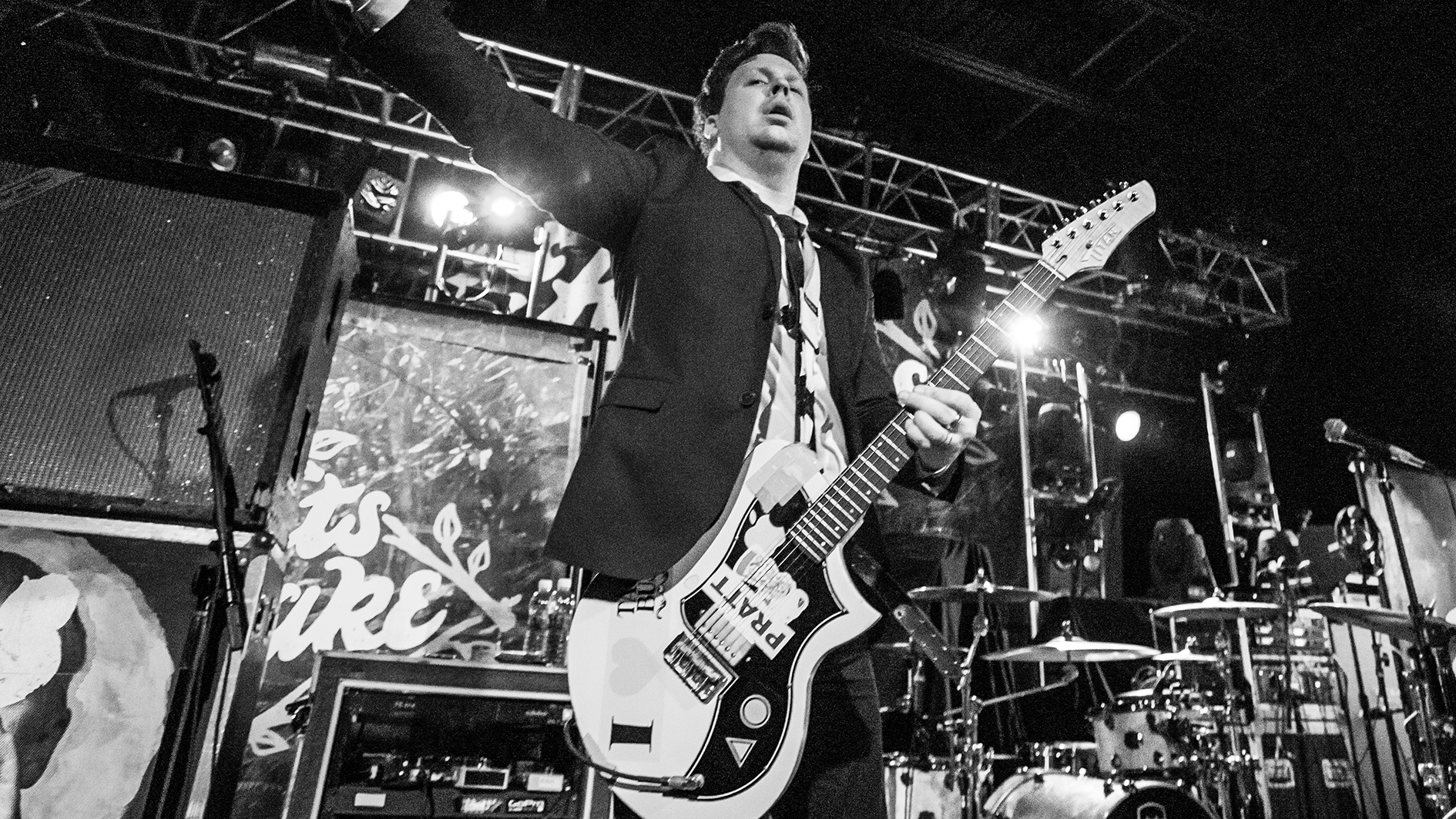
You won’t find him throwing jazz hands, but Josh Scogin, the enigmatic guitarist and frontman for rock duo ’68, lives for the stage.
Through his early years with Norma Jean, through to his time leading hardcore heroes The Chariot and now reinventing the rock duo for the heavy crowd with ’68 (completed by drummer Nikko Yamada) it has been the live environment which has kept him hooked.
When the pandemic hit, he holed up at home in Georgia and has spent each day eagerly awaiting the time when he can once again plug into his (ridiculous) live setup and excoriate a crowd with a wall of viscous riffs.
“It’s like a devoted, dedicated soldier with no war,” reflects Scogin. “This is the thing that I train for and that I love doing, so to have it snatched away, it just seems odd. Every person in the world dealt with it in some way. There's nothing new, unique or different with us. But I'm not very good at sitting around twiddling my thumbs!”
Of course, Scogin has nonetheless found ways to keep busy: prepping the release of ’68’s third album Give One Take One (produced by rock maestro Nick Raskulinecz), writing and releasing a brand new EP (Love Is Ain’t Dead) and rekindling his relationship with the guitar, in the process.
We spoke to the guitarist and songwriter about his surreal pandemic practice sessions, the making of Give One Take One and a few of the secrets behind his immense live tone.
What has your relationship with the guitar been like for the last year?
Get The Pick Newsletter
All the latest guitar news, interviews, lessons, reviews, deals and more, direct to your inbox!
“Yeah, I'm like desperately [in love with it]! I’m polishing it! It's the closest thing I have to the other side of that tunnel, you know? I'm literally looking at it right now. It's always within arm's reach of where I'm at.
“I have a couple throughout my house and two in an office that I have 10/20 minutes away, so there's always one near me. I've definitely played it a lot. I’m a better guitarist now than when this thing started. It will be nice to get to flex those skills when we're back doing things.”
Have you been focussing on any particular aspects of your playing?
“No. I just sort of noodle around, as I have for the entirety of me playing guitar! But I've never had practice time [like this]. Time to sit and just jam around. Even when I'm writing an album, it's still got more of a focus, like, ‘Okay, I need to produce a song out of this.’ Now, I almost have to force myself not to write new songs! I kind of don't want that many options.
“I've relearned some old tunes from '90s rock bands that I used to know how to play and I haven't done that for years. I'll tell you this: when I first started, before I ever even got a guitar, I'd be strumming on an air guitar just pretending to play live.
As a teenager, I would spend hours just goofing around in my room strumming on an air guitar
“As a teenager, I would spend hours just goofing around in my room doing that. So 2020 was the first year I can remember ever, because I've toured so much, that I'm having those dreams and those visions again.
“But now I know what it's like, because I've done it and I'm like, pretending there's a crowd and we're just having such a good time! It's a very, like surreal thing…”
There’s something quite meditative about that, isn’t there?
“Yeah, it really is. I love playing live and I've never taken it for granted, but I've never had the time to like fall in love with the idea of it again. So it’s been like remembering your first love. Even where I'm at today and the things that I've been able to do, I still just want to get out and play live. It’s still a beautiful thing, at least in my own psyche, you know?”
I think the first shows back are going to be really intense and everyone is also going to be horribly out of shape. There’s gonna be a bunch of injuries!
“It’s funny that you mention that, because I've literally been preparing for it! I’ve never been one to exercise and I’ve obviously been sitting around for the entirety of 2020, so in February I just was like,’Okay you know I've got to get prepared for a show to happen at any moment.’
“Because if anybody says, ‘Hey, we want you to tour and we're starting next week!’ I want to be ready for it. So, as uneducated as I am in the field of physical health, I’ve been trying to run every day and if not every other day and do little things like stretches.
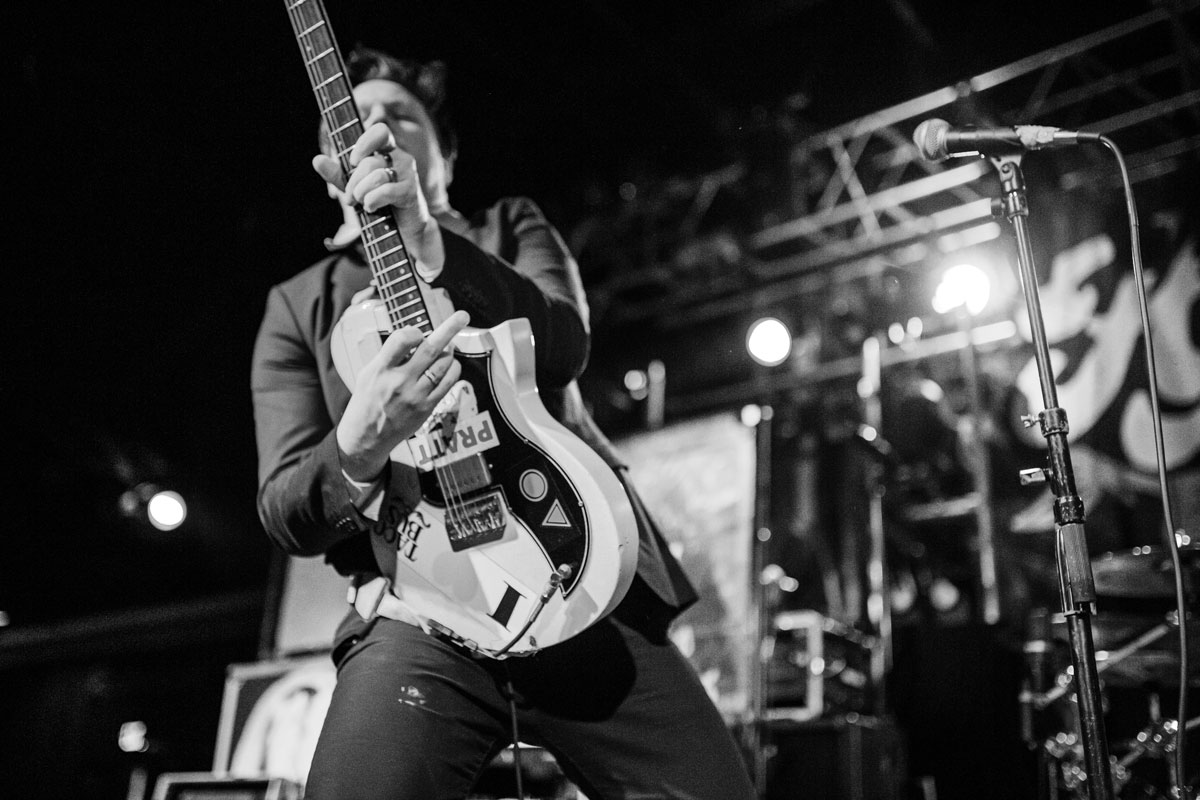
“There's a lot of stuff that when you tour every single day of your life you don't have to [think about], but when you've been sitting still for a year and a half, you’ve got to take that into account.
“I can't wait to to get back out there. I think people understand the importance of it now. The importance of something as simple as going out to eat lunch together, you’re taking that and multiplying it by 10 when you go to a rock show. You're all dancing on that same vibration. That's what we were created for, you know? To be this gigantic community.”
Let's talk about the new record Give One Take One. You've been sitting on this material since 2019 now. What has that done to your relationship with these songs?
“I haven't really listened to the songs since 2019, so it is still fresh for me. It's funny because [with the change of context] a lot of these lyrics went from being ‘something I believe’ into like ‘desperation’.
“Like the first song [The Knife, The Knife, The Knife] for example, one of the easy lines to pick out is, ‘Step aside and let the audience sing along.’ When I wrote that in 2019 we had just got off tour and we had another tour coming up in a month and we recorded it all during that time.
All the stuff I wrote [before the pandemic] still rings true, but now there's this sort of rocket jet behind it
“But still, back in that time, I'm expressing how much I can't wait for humans to be in one room and all of us – different backgrounds, different races, different religions, different beliefs – to be all singing together.
“And now it might be two years before we actually perform that song live. Now it's this desperation. All the stuff that I wrote still rings true, but now there's this sort of rocket jet behind it.”
The Knife, The Knife, The Knife has the line, ‘We got the vaccine so the disease cannot shake me’. That was written before the pandemic?
“Yeah. And how hilarious is that? I try not to be so on the nose – those are usually my least favorite lyrics from artists! When I wrote that lyric, keep in mind, none of us had even used the word pandemic outside of school.
“It was about the idea of needing humans, like that's the disease, but I'm not going to let it shake me because I have the vaccine, which is that I get to go out, I get to play shows.
“It was a very light-hearted lyric in itself, but all of a sudden, those lyrics became so literal. And as an artist I would never say something that on the nose, but here we are!”
What character did Nick Raskulinecz bring to the table as the record’s producer?
“There's plenty of producers who do one thing really good, whereas Nick, months before working with us, he was doing Alice In Chains and I think Korn prior to that, then Code Orange.
“Not a lot of producers can do that [variety], because those are different worlds that you've got to navigate. When I flew up to meet him to talk about doing the album, I was already kind of nervous that he would think that we're some top 40 type of band, but immediately, he was like, ‘Oh, I get it…’ The confidence was there.
“It’s funny because I imagine Jerry Cantrell from Alice In Chains shows up with an actual guitar solo that is on a scale that makes sense. And here I am and Nick’s like, ‘Wait, didn't you say that there's a guitar solo here?’ And I'm like, ‘Yeah, I'll just make it up as I go…’ And he's like, ‘What key is it?’ And I'm like, ‘Oh, I don't know. Just give me like four or five takes, I'll get something!’
“But he totally jumped right in there. He wasn't trying to make us sound like Alice In Chains. He was trying to make us sound like the best version of us.”
We used my two Titan guitars on almost every single song
What were your main guitars for the sessions? Did you use many from Raskulinecz’s collection?
“He has so many guitars. He deals with real bands, so I remember I went in to hang out with him one day when Korn was recording and they just had like 18 guitars of theirs laying around.
“I showed up with my two guitars! They're Titan Guitars from California and it's just a brilliant guitar [Scogin’s model has a single Seymour Duncan humbucker, wired direct to the output jack] and since I’m in such a unique tuning we used those on almost every single song.
“Even though Nick has these a plethora of guitars, the Titans just worked: they stayed in tune, they're a clean sound and they’re great.
“I will say this though, Nick has a guitar that Tom Petty owned before him and so I forced a spot where we had to use that. I literally placed like two strums on an intro because I was like, ‘I’m not gonna leave here and say I didn't use the guitar that Tom Petty once owned!’”
Were you using a lot of different pedals and amps?
“As far as pedals, there's no way I could say now. I mean we used so many. There's a picture somewhere deep down in my Instagram of the pedals and the caption is we used every one of these and it's true.
A post shared by ‘68 (@theyare68)
A photo posted by on
“Typically speaking, the average '68 heavy sound is an [Electro-Harmonix] POG 2 and a Big Muff, and then I might have a [Boss] Blues Driver, even, cranking it just a bit more.
“Then we used a Marshall a lot for the bluesy stuff and a Sovtek a great deal, maybe a Vox. Live, I treat it as if there's two guitarists and a bassist on stage so yeah when I’m recording I’m having to record for all those parts and we purposely tried to make each guitarist use different stuff so that it would layer it.”
How do you handle the signal-splitting side live, if you’re running two guitars and a bass line out of one guitar?
“I literally split it three ways. So I’ve got guitar stage left, guitar stage right and bass. It's a highly complicated system because let's say you split a guitar to A and B, well, now you're dealing with 50% of the power and 50% of the power.
I have no idea what the future holds but crowd-willing, there's at least two or three more ’68 albums coming
“So if you split it three ways that’s even less and so you have to have really, really clean boosts on all three channels to boost the signal up. But you know, some of that dives into sort of the secret sauce!
“Then I add all the dirt with with fuzzes and different delays on each one. Each guitarist has his own delay and the bass has distortion and clean and chorus effects that I can turn on and turn off.”
Do you have to lay out your pedalboard for each ‘player’ or do you mix it up?
“Oh, yeah. Every single tour, it's a little different. And so there's always these kind of color-coded sections on my board, whether it's gaffer tape, or I just paint over the pedal.
“Then there's some things that shouldn't be next to the other things because if you hit the tuner pedal, it mutes everything, because that's before the split. I learned that the hard way through a couple tours!
“Believe me I've had plenty of train wrecks, especially in the beginning and I'm not immune to it now. We're always walking that tightrope of and anybody that's seen us multiple times knows that. I think half the fun is like, ‘Yeah, they could fall apart at any, any moment…’”
What does success with this record look like for you at this moment in time?
“Just to get back and play live. That's all I care about. That's the reason I record albums, so I can play more live shows. The album's out now and it seems like people are digging it, which is nice, so it seems like we'll get another couple years of touring. It’s not guaranteed. I mean every band is just one bad album away from never existing.”
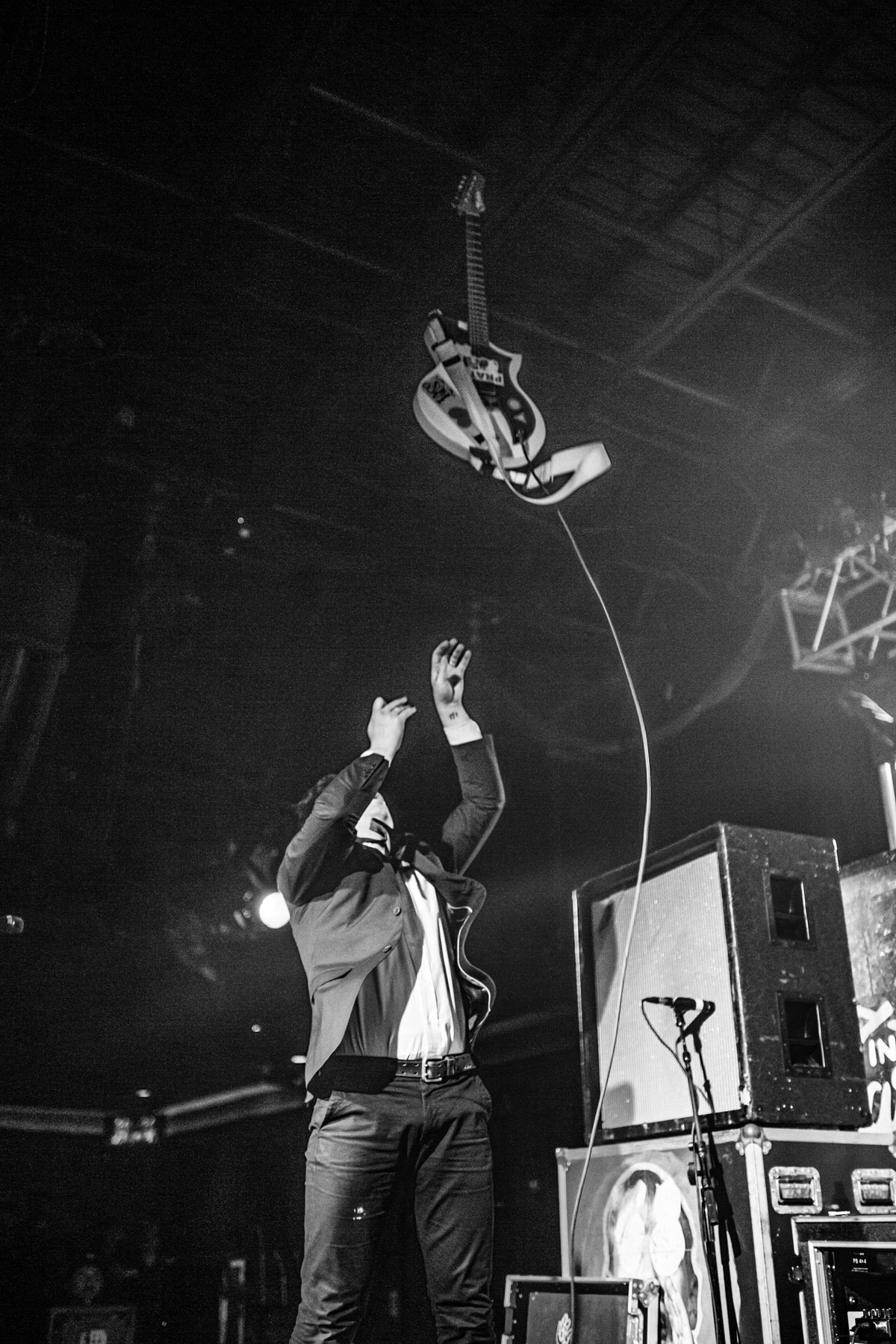
That's interesting you say that, because when you read comments from your fans there is this fear among them that if they shout too loud about your stuff you'll stop doing it!
“Haha! I think it’s because I started a band in high school called Norma Jean and right when it was going up I left and then I started The Chariot and then, you know, we were unarguably the biggest we had ever been and we called it quits, so I think that's sort of a 'cause and effect' based on the fact that I just keep leaving different bands!
“I don't know. There's no end goal for me, there's no destination. It's all about the journey. That's what I love and I find beauty in the struggle, so maybe that's not completely untrue.
“At the moment I have no idea what the future holds but I do know that now I’m definitely still in the journey, so crowd-willing, there's at least two or three more [’68] albums coming.”
- Give One Take One is out now via Cooking Vinyl.

Matt is Deputy Editor for GuitarWorld.com. Before that he spent 10 years as a freelance music journalist, interviewing artists for the likes of Total Guitar, Guitarist, Guitar World, MusicRadar, NME.com, DJ Mag and Electronic Sound. In 2020, he launched CreativeMoney.co.uk, which aims to share the ideas that make creative lifestyles more sustainable. He plays guitar, but should not be allowed near your delay pedals.
“I asked Marcus to sing on it. As amazing as he is on bass, I think he’s underrated as a vocalist”: Having earned lofty status in bass-hero circles, Marcus Miller lent his vocal chops to Hadrien Feraud’s solo album
"They said, 'We don't have a direction yet, but you got the gig!' I said, 'Well, let me think about it'": Yngwie Malmsteen on why he turned down UFO


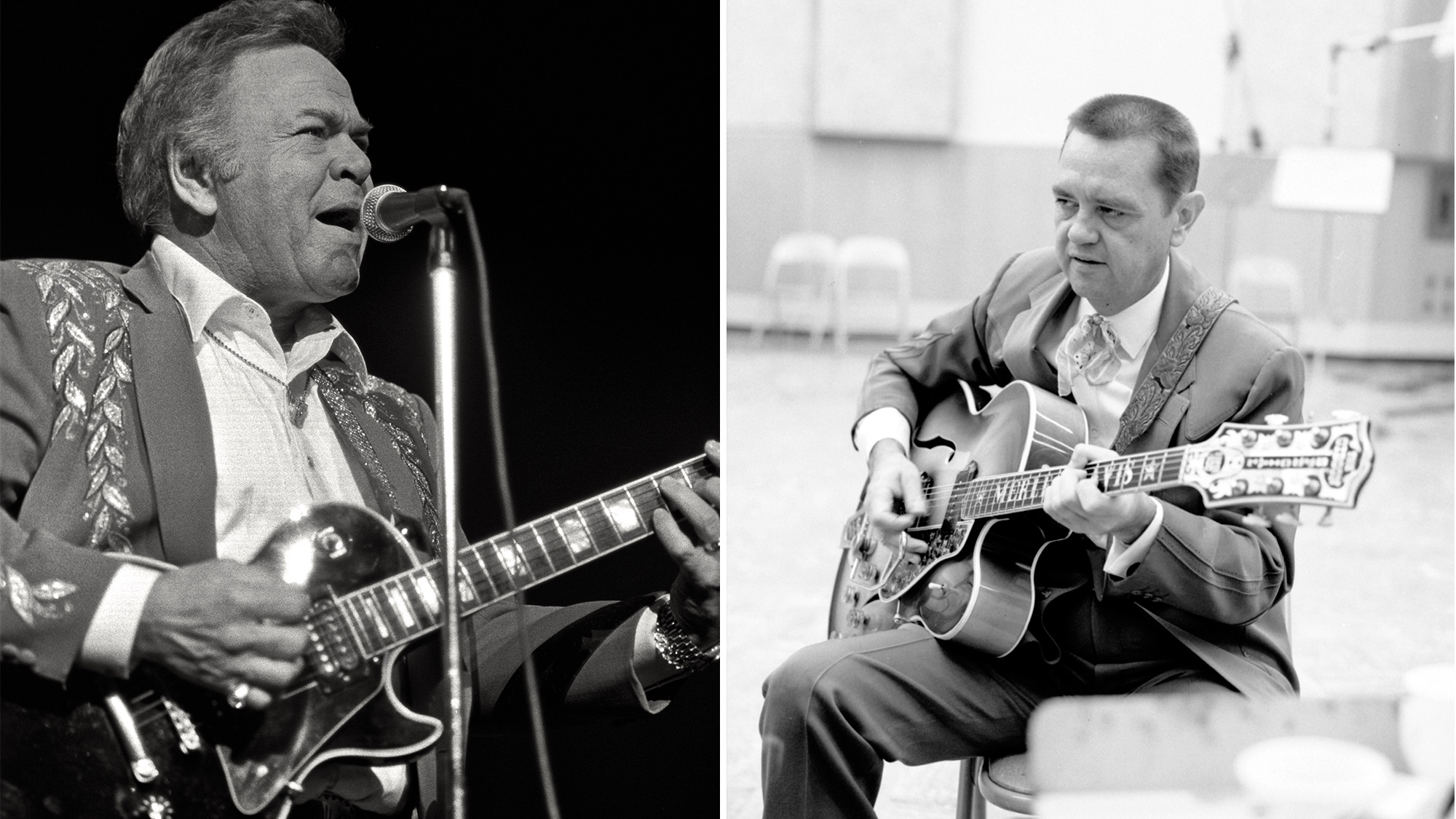
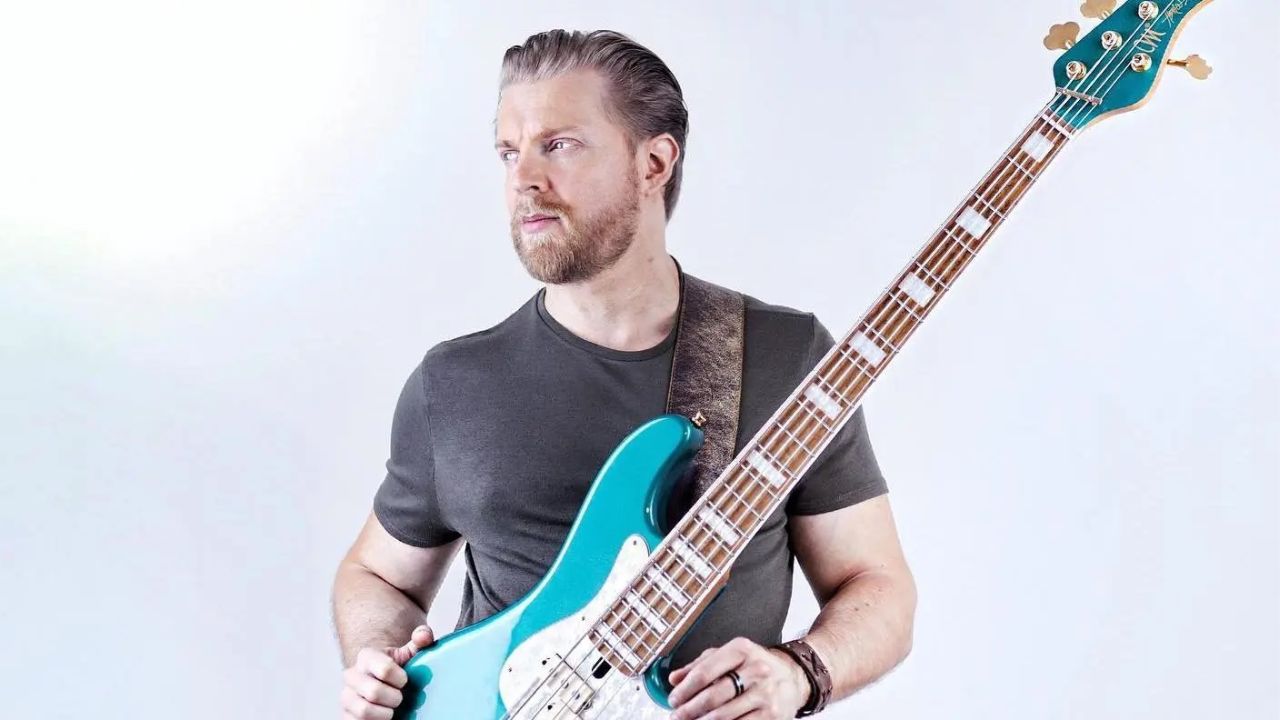







![[from left] George Harrison with his Gretsch Country Gentleman, Norman Harris of Norman's Rare Guitars holds a gold-top Les Paul, John Fogerty with his legendary 1969 Rickenbacker](https://cdn.mos.cms.futurecdn.net/TuH3nuhn9etqjdn5sy4ntW.jpg)